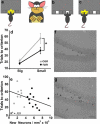When neurogenesis encounters aging and disease
- PMID: 20961627
- PMCID: PMC2981641
- DOI: 10.1016/j.tins.2010.09.003
When neurogenesis encounters aging and disease
Abstract
In this review, we consider the evidence that a reduction in neurogenesis underlies aging-related cognitive deficits and impairments in disorders such as Alzheimer's disease (AD). The molecular and cellular alterations associated with impaired neurogenesis in the aging brain are discussed. Dysfunction of presenilin-1, misprocessing of amyloid precursor protein and toxic effects of hyperphosphorylated tau and β-amyloid probably contribute to impaired neurogenesis in AD. Because factors such as exercise, environmental enrichment and dietary energy restriction enhance neurogenesis, and protect against age-related cognitive decline and AD, knowledge of the underlying neurogenic signaling pathways could lead to novel therapeutic strategies for preserving brain function. In addition, manipulation of endogenous neural stem cells and stem cell transplantation, as stand-alone or adjunct treatments, seems promising.
Copyright © 2010 Elsevier Ltd. All rights reserved.
Figures





References
-
- Sharpless NE, DePinho RA. How stem cells age and why this makes us grow old. Nature reviews Mol Cell Biol. 2007;8(9):703–713. - PubMed
-
- Suh H, Deng W, Gage FH. Signaling in adult neurogenesis. Annu Rev Cell Dev Biol. 2009;25:253–275. - PubMed
-
- Carleton A, et al. Becoming a new neuron in the adult olfactory bulb. Nat Neurosci. 2003;6(5):507–518. - PubMed
-
- Platel JC, Lacar B, Bordey A. GABA and glutamate signaling: homeostatic control of adult forebrain neurogenesis. J Mol Histol. 2007;38(6):602–610. - PubMed
Publication types
MeSH terms
Substances
Grants and funding
LinkOut - more resources
Full Text Sources
Other Literature Sources
Medical

